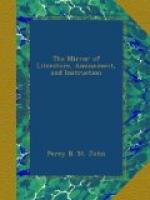Oh there is not on earth a breast, but
turns
with joy to thee.
From the cold wither’d years of
age, to smiling
infancy.
Thou claimest smiles from ev’ry
lip, and praise
from ev’ry tongue;
Such sympathy each happy heart finds in
thy
joyous song.
Dorking.
SYLVA.
* * * * *
THE COSMOPOLITE.
SUPERSTITIONS, FABLES, &C. RELATIVE TO ANIMALS.
(Continued from page 180.)
The following curious notice of the Acherontia Atropos, or Death’s-head Moth, we extract from “The Journal of a Naturalist:”—“The yellow and brown-tailed moths,” he observes, “the death-watch, our snails, and many other insects, have all been the subjects of man’s fears, but the dread excited in England by the appearance, noises, or increase of insects, are petty apprehensions compared with the horror that the presence of this Acherontia occasions to some of the more fanciful and superstitious natives of northern Europe, maintainers of the wildest conceptions. A letter is now before me from a correspondent in German Poland, where this insect is a common creature, and so abounded in 1824 that my informant collected fifty of them in a potato field of his village, where they call them the ‘death’s-head phantom,’ the ‘wandering death-bird,’ &c. The markings on the back represent to their fertile imaginations the head of a perfect skeleton, with the limb bones crossed beneath; its cry becomes the voice of anguish, the moaning of a child, the signal of grief; it is regarded, not as the creation of a benevolent being, but as the device of evil spirits—spirits, enemies to man, conceived and fabricated in the dark; and the very shining of its eyes is supposed to represent the fiery element whence it is thought to have proceeded. Flying into their apartments in an evening, it at times extinguishes the light, foretelling war, pestilence, famine, and death to man and beast. * * * This insect has been thought to be peculiarly gifted in having a voice and squeaking like a mouse when handled or disturbed; but, in truth, no insect that we know of has the requisite organs to produce a genuine voice; they emit sounds by other means, probably all external.”
The Icelanders believe Seals to be the offspring of Pharaoh and his host; who, they assert, were changed into these animals when overwhelmed in the Red Sea. The Grampus, Porpoise, and Dolphin, have each from the earliest ages been the subject of numerous superstitions and fables, particularly the latter, which was believed to have a great attachment to the human race, and to succour them in accidents by sea; it is a perfectly straight fish, yet even painters have promulgated a falsity respecting it, by representing it from the curved form in which it appears above water, bent like the letter S reversed.




